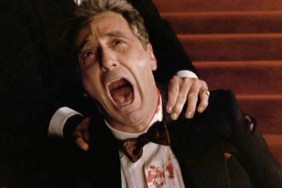They say that living well is the best revenge, but that wouldn’t make for a kickass movie, so instead “Revenge Movies” became a prolific and legitimate motion picture genre. We all understand what it’s like to feel wronged, we have all fantasized about exacting our own particular brand of justice, and since we live in a world of morality and consequences we usually don’t go through with it. But the characters in our movies can, and they offer a brief catharsis to the rest of us… or at least a cautionary example of why we should probably let the police handle all the crime fighting for us.
This week, the critically acclaimed new western The Revenant expands to theaters nationwide, and it’s another brutal saga of vengeance in which a half-dead Leonardo DiCaprio crawls through the icy wilderness to do violence against the Tom Hardy who destroyed his life. It’s a very good revenge movie, but not the best. So we asked ourselves… what is the best revenge movie ever made?
Related: ‘The Revenant’ Review | Apocalypse Snow
Or rather, we asked our three film critics – Crave’s William Bibbiani and Witney Seibold, and Collider’s Brian Formo – to decide once and for all. They can only pick one movie each to hold up as the pinnacle of the genre, and as usual, they couldn’t agree on a single film.
Find out which revenge movies they picked, let us know your own favorites, and come back next Wednesday for another highly debatable installment of The Best Movie Ever!
Witney Seibold’s Pick: The Virgin Spring (1960)

Janus Films
Revenge – particularly a violent form of frontier justice – is used as the motivating factor for such a large volume of movie characters, you would think that the very notion of hateful retribution is a central driving force in human discourse. I suppose revenge is an easy-to-understand motivator, but ultimately it smacks of lazy screenwriting. A man or woman was wronged, and violence is necessary to balance the scales of justice. A to B to C. When constructing a dramatic story, revenge will do. But revenge is, in fact, incredibly rare in real life; how many people do you personally know who have engaged in a retributive slaying? The real-life impacts of revenge are rarely explored in cinema, and the sticky emotional and moral complications of such actions are hardly ever examined.
So it falls to master Ingmar Bergman to examine the morals, the pitfalls, and the horrors of revenge. His 1960 film The Virgin Spring is a story of revenge, but the type of revenge that is not cathartic or meaningful. It may not even be right. But it’s an impulse we must face. In medieval Sweden, a placid country family dotes on their pretty, virginal daughter. They are all blissfully happy and devoutly Christian. The feisty, pregnant servant girl doesn’t think mush of them. When the innocent daughter wanders into the woods to deliver candles to the local church, she is beset by a band of bandits who flirt with her, threaten her, and then rape and murder her, kind of on a whim. The rapists, wracked by horror and guilt over their own actions, seek shelter at a nearby cottage. The cottage of the girl’s family.
There are some excellent thriller elements built into this sort of story (Will the parents find out? Will the rapists confess? Will there be violence?), but Bergman knows better than to stay within the realm of the visceral. Bergman wants to see the facts of the matter. One crime was committed. Revenge would just be a second crime. This is not justice, but a strange sort of sacrament, lingering in the darker corners of the human subconscious. Will there be violence? Yes. But the ending of the film is the real – and unexpected – catharsis. Perhaps we need less revenge, and more penance.
Brian Formo’s Pick: The Godfather (1972)

Paramount Pictures
There Will Be Blood isn’t a classical story of revenge but its final line, “I’m finished” – uttered by the victor, on his knees, beside a foe who’d just been bludgeoned to death with a bowling pin – best defines how many revenge films end: with the completion of a task. For a revenge movie to really excel it has to have some extra higher plane of existence beyond just the completion of killing someone who’s wronged the main character.
Thus, the reason why The Godfather is the best revenge movie of all time is because it drops us into the organized crime world via familial duty and ascension. And because of the deep attention to the family side of the illegal business – chiefly the differences between three brothers, Sonny Corleone (James Caan), Fredo Corleone (John Cazale) and Michael Corleone (Al Pacino) – the film becomes both a tragedy (that Michael must be the one who ascends because both Sonny is viciously and unceremoniously murdered and his other brother, Fredo, is too sensitive) and a rebirth.
William Bibbiani’s Pick: Oldboy (2003)

Tartan Films
Movies have a tendency, for better or worse, to make horrible things seem “cool.” War movies rarely capture the true horrors of the battlefield, cop movies rarely do justice to the vast amount of paperwork involved, and revenge movies are usually about catharsis. Or, at best, they admit that revenge is a vicious cycle, and the wronged party receives justice at the end, and the loop gets closed forever.
There is perhaps only one movie that dramatizes the true cost of living with vengeance in your heart. Chan-wook Park’s Oldboy tells the story of an unremarkable drunkard who is kidnapped, imprisoned in a hotel room without explanation for 15 years, and then released just as inexplicably. Oh Dae-su (Min-sik Choi) is consumed by a vicious desire to learn his captor’s identity, and take his own revenge, but to do so, Oh Dae-su must uncover the mystery of why someone would want to take revenge on him in the first place.
Oldboy illustrates that violence, when meted out with perceived righteousness, feels great. Chan-wook Park films Oh Dae-su’s journey with high contrast style, and his unforgettable hallway hammer fight is one of the greatest action sequences ever filmed. But as Oldboy progresses, and its mysteries are revealed (I’ll never tell), we begin to see the true horrors of vengeance, and the shocking toll that merely living our lives can have on other people. If revenge was justified at any time, in any way, the world would be a place of continuous and unspeakable horrors. It feels good for a moment but it culminates in shock and misery and ultimately it was never worth the trouble.
Oldboy is the revenge movie to end all revenge movies. (Avoid the remake. It sucks.)
Previously on The Best Movie Ever:
Top Photos: Janus Films / Paramount Pictures / Tartan Films
The Best Movie Ever
-
The Best Movie Ever | Under the Sea

Is the best movie ever set underwater a family film about a fish or a World War II movie about a German submarine?
Photos: Disney / Pixar / Neue Constantin Film
-
The Best Movie Ever | Video Game Adaptations

There aren't a lot of good video game adaptations, and our critics just can't agree on which one is the best.
Photos: Universal Pictures / New Line Cinema / Dimension Films
-
The Best Movie Ever | Reptiles

Movies about slithery things aren't very common, so our critics are presenting their picks for the best reptile movies ever.
Photo: Warner Bros. / Paramount Pictures / New Line Cinema
-
The Best Movie Ever | Helena Bonham Carter

Is Helena Bonham Carter's best movie a classy costume drama or a twisted critique of contemporary masculinity?
Photo: Fine Line Features / Miramax Films / 20th Century Fox
-
The Best Movie Ever | Crime Comedies

What's the best comedy ever made about living a life of crime? Our critics present their picks.
Photo: MGM / Warner Bros. / Janus Films
-
The Best Movie Ever | Jodie Foster

The Oscar-winning actor/director is one of the most respected artists in the film industry. But what's her best movie ever?
Photo: Columbia Pictures / Warner Bros. / MGM Home Entertainment
-
The Best Movie Ever | Robert Downey Jr.

The man who would be Iron Man has had one of the most unusual careers in film history, but which movie is his best?
Photo: Warner Bros. Pictures / Paramount Pictures
-
The Best Movie Ever | Cats

Keanu may be a great comedy about a cat, but what's the best cat movie ever? Our critics picked some WEIRD films this week!
Photo: Drafthouse Films / United Artists / Kindai Eiga Kyokai
-
The Best Movie Ever | Charlize Theron

Is Charlize Theron's best movie the one that earned her an Oscar, or the one that kicked ass?
Photo: Warner Bros. / Newmarket Films
-
The Best Movie Ever | Ice Cube

It's been 25 years since Ice Cube made his acting debut. So what's his best movie ever?
Photo: Miramax Films / New Line Cinema / Universal Pictures
-
The Best Movie Ever | Dreams

What's the best movie ever made about dreams, dreaming or dreaminess? Our critics present their picks.
Photo: Films du Losange / Criterion / Fox Searchlight
-
The Best Movie Ever | Batman

Everybody loves Batman, but what's the best Batman movie ever? Our critics can't agree in this week's roundup.
Photo: 20th Century Fox / Warner Bros.
-
The Best Movie Ever | Superman

Batman v Superman isn't the best Superman movie ever, so we asked our stable of critics to decide which one is.
Photo: Warner Bros.
-
The Best Movie Ever | Justice

Let's celebrate this exciting new Dawn of Justice with a spirited debate about the best movie ever made about justice itself.
Photo: Koch-Lorber / 20th Century Fox / United Artists
-
The Best Movie Ever | John Goodman

The star of 10 Cloverfield Lane has had an astounding career, but what's his best movie ever?
Photo: Gramercy Pictures / 20th Century Fox
-
The Best Movie Ever | Die Hard Ripoffs

Die Hard spawned a whole genre of action movies that live on to this day, but which Die Hard ripoff is the best?
Photo: 20th Century Fox / Columbia Pictures / Golden Princess Film Production
-
The Best Movie Ever | Oscar Bait

'Oscar bait' isn't an insult, it's a genre. So what's the best Oscar bait movie ever?
Photo: The Weinstein Company / Universal Pictures
-
The Best Movie Ever | Witchcraft

What's the most bewitching movie ever made about witches? Our panel of critics narrows it down to two classic films.
Photo: Criterion / American International
-
The Best Movie Ever | Action Comedies

If Deadpool isn't the best action comedy ever, what is? Our panel of film critics make the case for their favorites.
Top Photo: Warner Bros. / RM Films International / 20th Century Fox
-
The Best Movie Ever | George Clooney

Everyone loves George Clooney, but none of our critics can agree on which film qualifies as his very best.
Photo: Buena Vista / Universal / Warner Bros.
-
The Best Movie Ever | Martial Arts

Our panel of critics fights over their picks for the best martial arts movie ever made. There can be only one!
Top Photo: Shaw Bros. / Warner Bros. / Toho
-
The Best Movie Ever | Creepy Dolls

Everyone's frightened of little toy people, but what's the creepiest creepy doll movie ever?
Top Photo: Universal Pictures / United Artists / New World Pictures
-
The Best Movie Ever | Modern Warfare

If 13 Hours isn't the best movie about our contemporary wars, what is? Our panel of critics weighs in.
Photo: Warner Bros./Columbia Pictures/Summit Entertainment
-
The Best Movie Ever | Revenge

If The Revenant isn't the greatest revenge movie, what is? Our film critics nominate some of the best films ever made.
Top Photos: Janus Films / Paramount Pictures / Tartan Films
-
The Best Movie Ever | Parties

We asked our critics to pick the best party movie ever made, and none of them picked a film about a frat house.
Photo: Warner Bros. / 20th Century Fox / Sony Pictures Classics
-
The Best Movie Ever | Quentin Tarantino

Is the Hateful Eight director's best film an autumnal romance or a World War II drama? Our critics can't decide.
Photos: The Weinstein Company / Miramax
-
The Best Movie Ever | Star Wars

Is A New Hope better than The Empire Strikes Back? Our critics debate the classics (and ignore the rest).
Photos: Disney / LucasFilm
-
The Best Movie Ever | Ron Howard

He's directed films in nearly every genre and won an Oscar for his troubles, but what's the best Ron Howard movie ever?
Photo: Touchstone / Universal / MGM
-
The Best Movie Ever | William Shakespeare

He's the most adapted author in movie history, but which William Shakespeare movie is the very best?
Photo: Top Photos: Toho / Paramount / Columbia
-
The Best Movie Ever | Pixar

Everyone has their favorite Pixar movie, but which one is the best?
Photo: Disney
-
The Best Movie Ever | Young Adult

Before you say goodbye to The Hunger Games, find out what our critics think was the best young adult movie ever.
Photo: Universal Pictures / Warner Bros.
-
The Best Movie Ever | Angelina Jolie

She's been acting for decades, directing for years, and winning our admiration forever. But what is Angelina Jolie's best film ever?
Photo: The Samuel Goldwyn Company / HBO / Columbia Pictures
-
The Best Movie Ever | James Bond

It's new school versus old school! Our critics debate which film qualifies as the best Bond movie ever.
Photo: MGM / Colombia Pictures / United Artists
-
The Best Movie Ever | Sandra Bullock

Our critics can only agree on one thing: the best Sandra Bullock movie isn't the one that got her an Oscar.
Photo: 20th Century Fox / Warner Bros.








